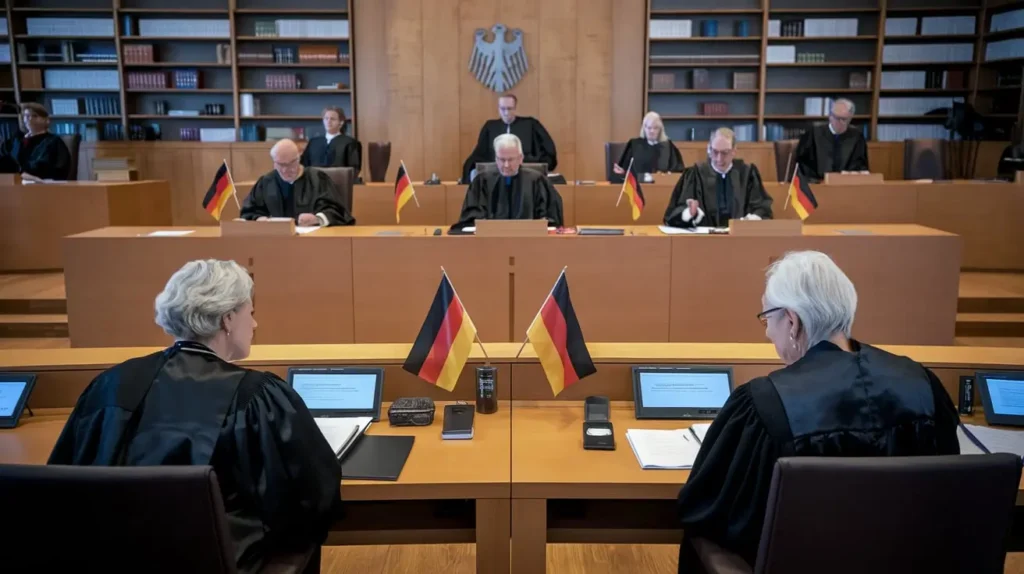
German Political System:
A Guide for Naturalization Test Preparation
Are you preparing for the German naturalization test? Understanding the structure and institutions of German politics is crucial for your success. This comprehensive guide will walk you through the key aspects of Germany’s political system, from its federal structure to the roles of various governmental bodies. By the end of this article, you’ll have a solid grasp of how German politics works, and you’ll be well-prepared for the political questions in your naturalization test. Don’t forget to check out the FAQ quiz at the end to test your knowledge!
Structure and institutions of German politics
Germany uses a mixed electoral system:
First Vote
Directly elects local representatives
Second Vote
Determines overall party representation
Parties need at least 5% of second votes or 3 direct mandates to enter the Bundestag.
The Federal System of Germany
Germany operates under a federal system, which means that power is distributed between the central government and the 16 federal states (Bundesländer). This system ensures a balance of power and allows for regional autonomy while maintaining national unity.
Key Features of German Federalism:
- Division of Powers: Responsibilities are shared between the federal government and the states.
- State Autonomy: Each state has its own constitution, parliament, and government.
- Bundesrat: The Federal Council represents state interests at the national level.
- Fiscal Federalism: Both levels of government have their own tax revenues and budgets.
The German Constitution: Grundgesetz
The Grundgesetz, or Basic Law, is Germany’s constitution. Adopted in 1949, it serves as the foundation of the country’s political system and guarantees fundamental rights to all citizens.
Key Aspects of the Grundgesetz:
- Human Dignity: Article 1 declares the inviolability of human dignity.
- Fundamental Rights: Guarantees basic rights such as freedom of speech, religion, and assembly.
- Rule of Law: Ensures that all state actions are subject to legal oversight.
- Federal Structure: Outlines the division of powers between federal and state governments.
- Democracy: Establishes Germany as a democratic and social federal state.
Understanding the Grundgesetz principles is essential for the German naturalization test, as it forms the bedrock of German democracy and citizenship.
The German Parliament: Bundestag and Bundesrat
Germany’s parliament consists of two chambers: the Bundestag and the Bundesrat. This bicameral system ensures representation of both the people and the federal states in the legislative process.
Bundestag: The Lower House
The Bundestag is the main legislative body in Germany. Its members are directly elected by the people every four years through a mixed electoral system.
Key Functions of the Bundestag:
- Passing federal laws
- Electing the Federal Chancellor
- Overseeing the work of the government
- Approving the federal budget
Bundesrat: The Upper House
The Bundesrat represents the interests of the 16 federal states. Unlike the Bundestag, its members are not directly elected but are appointed by state governments.
Key Functions of the Bundesrat:
- Participating in the legislative process, especially for laws affecting state interests
- Serving as a link between federal and state governments
- Appointing judges to the highest federal courts
The Executive Branch: Federal Government and Chancellor
The executive branch in Germany is led by the Federal Government, headed by the Federal Chancellor. This branch is responsible for implementing laws and managing day-to-day governmental affairs.
The Federal Chancellor
The Chancellor is the head of government and plays a crucial role in German politics. Key aspects of the Chancellor’s position include:
- Elected by the Bundestag
- Determines the guidelines of government policy
- Proposes ministers to the Federal President for appointment
- Serves as Germany’s representative in international affairs
The Federal Cabinet
The Chancellor leads the Federal Cabinet, which consists of federal ministers heading various departments. The cabinet is responsible for:
- Implementing laws passed by parliament
- Proposing new legislation
- Managing their respective ministries
- Collaborating on major policy decisions
The Federal President: Head of State
While the Chancellor is the head of government, the Federal President serves as the head of state. This largely ceremonial role includes:
- Representing Germany in international law and diplomatic relations
- Signing laws into effect
- Proposing a candidate for Chancellor to the Bundestag
- Appointing and dismissing federal ministers on the Chancellor’s recommendation
It’s important to note that the President’s powers are limited, reflecting Germany’s parliamentary system where the Chancellor holds most executive authority.
The Judiciary: Federal Constitutional Court

The Federal Constitutional Court (Bundesverfassungsgericht) plays a vital role in upholding the German constitution and protecting citizens’ rights.
Key Functions of the Federal Constitutional Court:
- Interpreting the Basic Law
- Resolving disputes between federal and state governments
- Protecting fundamental rights of citizens
- Reviewing the constitutionality of laws
The court’s decisions are binding on all other state organs, making it a powerful institution in the German political system.
Political Parties in Germany
Germany has a multi-party system, with several parties regularly represented in the Bundestag. Understanding the major parties is crucial for grasping German politics:
- Christian Democratic Union (CDU) / Christian Social Union (CSU): Center-right alliance
- Social Democratic Party (SPD): Center-left party
- Alliance 90/The Greens: Environmentalist and progressive party
- Free Democratic Party (FDP): Liberal party focusing on free-market policies
- Alternative for Germany (AfD): Right-wing populist party
- The Left (Die Linke): Left-wing party
These parties form coalitions to create governing majorities, often leading to compromises and consensus-based politics.
The Electoral System
Germany uses a mixed electoral system that combines elements of both proportional representation and first-past-the-post voting. This system, known as personalized proportional representation, aims to balance local representation with overall party strength.
Key Features of the German Electoral System:
- Voters cast two votes: one for a direct candidate and one for a party
- Half of the Bundestag seats are filled by direct mandates
- The other half is filled based on party lists to ensure proportional representation
- A 5% threshold for parties to enter the Bundestag (or winning at least three direct mandates)
This system often results in coalition governments, promoting cooperation and compromise in German politics.
Federalism in Action: Division of Responsibilities
Understanding how responsibilities are divided between the federal and state levels is crucial for the naturalization test. Here’s a brief overview:
Federal Responsibilities:
- Foreign policy and defense
- Citizenship and immigration
- Currency and monetary policy
- Federal taxes and customs
State Responsibilities:
- Education and cultural affairs
- Law enforcement and public safety
- Environmental protection
- Municipal affairs
Some areas, like social welfare and economic policy, involve cooperation between federal and state governments.
Germany in the European Union
As a founding member of the European Union, Germany plays a significant role in European politics. Key aspects to understand include:
- Germany’s representation in EU institutions (European Parliament, Council of the EU, etc.)
- The relationship between German law and EU law
- Germany’s role in shaping EU policies
- The impact of EU membership on German politics and economy
This European dimension adds another layer to Germany’s political structure and is an important topic for the naturalization test.
Civic Engagement and Participation
Understanding the ways German citizens can participate in the political process is essential for new citizens. Key aspects include:
- Voting in federal, state, and local elections
- Joining political parties or civic organizations
- Participating in public demonstrations and petitions
- Engaging in volunteer work and community service
Active civic participation is highly valued in German society and is an important aspect of citizenship.
Preparing for Your Naturalization Test
As you prepare for your German citizenship test, remember that understanding the structure and institutions of German politics is crucial. This article has covered the key aspects you need to know, from the federal system to the roles of various governmental bodies.
To help you reinforce your knowledge, we’ve included a FAQ quiz at the end of this article. Make sure to test yourself and identify any areas where you might need additional study.
German Politics Quiz
FAQ on German Political system
Remember, becoming a German citizen means not just understanding these concepts, but also being ready to participate actively in Germany’s democratic process. Good luck with your preparation, and welcome to German citizenship!

